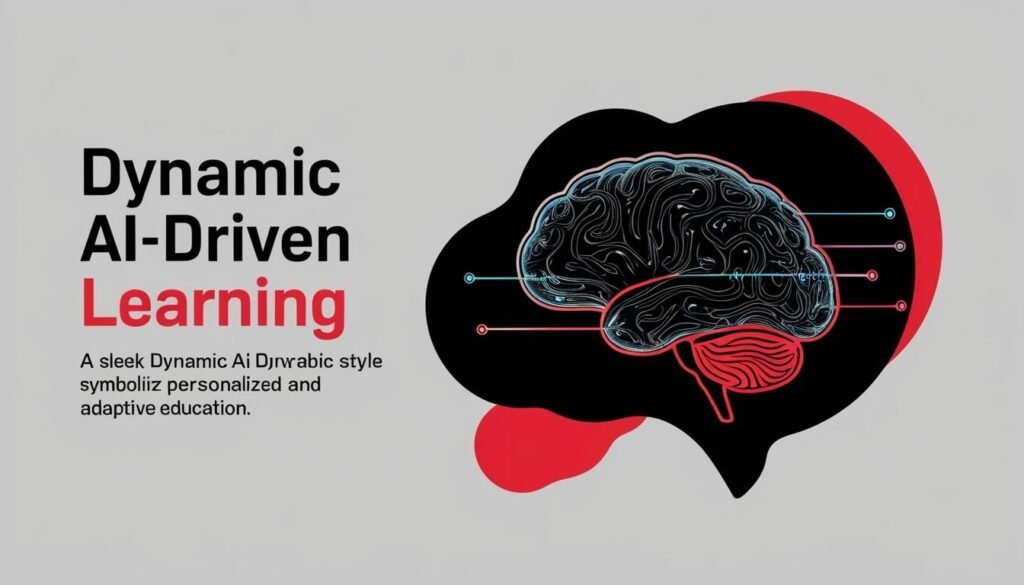The adaptive learning platforms market is rapidly expanding, with projections suggesting a market size of $5.3 billion by 2025, driven by AI and machine learning innovations that personalise student learning experiences.
The adaptive learning platforms market is experiencing significant growth, with projections indicating that the global market size will reach $5.3 billion by 2025. This represents a compound annual growth rate (CAGR) of 22.7% during the forecast period. These platforms leverage advanced machine learning algorithms and analytics to assess students’ strengths, weaknesses, and learning patterns, allowing for the provision of tailored educational content that facilitates individual progress.
In contrast to traditional educational methods, which are typically standardised, adaptive learning platforms are designed to pinpoint knowledge gaps and offer targeted resources. The integration of artificial intelligence (AI) technology plays a crucial role in the development of these platforms. Companies focused on AI services are utilising their expertise to create systems aimed at enhancing educational outcomes while mitigating the administrative burdens faced by teachers.
The adoption of AI in education comes with various benefits. AI-powered platforms enhance accessibility, ensuring that quality education is available to all students, including those residing in remote areas. The automated nature of these systems increases efficiency by handling routine tasks such as grading and attendance tracking, thereby allowing educators to devote more time to instruction. Furthermore, personalised learning experiences foster higher engagement levels, which correlate with improved knowledge retention. Financially, educational institutions can also benefit, as scalable AI solutions can lead to resource savings.
AI-powered adaptive learning platforms offer several key features. The first is the creation of personalised learning paths, as AI algorithms analyse student data to develop tailored educational experiences. Additionally, real-time feedback mechanisms allow students to identify and address challenges as they arise. Data-driven insights generated by these platforms enable educational institutions to make informed decisions based on comprehensive analytics regarding student performance. Scalability is another advantage, as these systems can accommodate a large user base simultaneously, making them suitable for larger institutions. Many platforms also incorporate gamification elements, such as points and leaderboards, to enhance the learning experience.
Generative AI is emerging as a pivotal force in the enhancement of adaptive learning platforms. By producing dynamic content, such as quizzes and interactive simulations, generative AI helps maintain learner engagement. A generative AI company may develop tools that generate personalised test questions based on user performance, thus ensuring a customised learning experience. Moreover, these capabilities promote the creation of multilingual content, making quality education accessible to a diverse student body across the globe.
As the demand for adaptive learning platforms grows, the choice of development company is crucial. Educational institutions are encouraged to partner with firms that have a track record in the education sector, ensuring they possess the necessary technical expertise. Essential factors to consider include the ability to customise solutions, compatibility with existing systems, and adherence to data security standards to protect student data, which remains a high priority.
Looking ahead, the future of adaptive learning appears bright. Innovations in AI development services are expected to lead to more sophisticated and intuitive platforms. The integration of emerging technologies like Virtual Reality (VR) and Augmented Reality (AR) is likely to offer immersive educational experiences, while advancements in Natural Language Processing may facilitate more conversational and interactive learning environments.
In conclusion, the evolution of adaptive learning platforms powered by AI signifies a noteworthy development in the educational landscape. By providing tailored learning experiences, equipping educators with critical insights, and streamlining administrative processes, these platforms represent a significant opportunity for institutions. As educational needs continue to evolve, embracing AI technologies will be vital to unlocking the full potential of adaptive learning systems.
Source: Noah Wire Services
- https://elearningindustry.com/how-ai-is-revolutionizing-education-building-adaptive-learning-platforms-for-the-future – Corroborates the growth of the adaptive learning platforms market, projected to reach $5.3 billion by 2025 with a CAGR of 22.7%, and the use of machine learning algorithms and analytics to tailor educational content.
- https://vorecol.com/blogs/blog-comparing-traditional-learning-methods-with-adaptive-learning-in-lms-183371 – Supports the benefits of adaptive learning, including increased student engagement and retention rates, and improved academic performance, particularly in subjects like mathematics and reading.
- https://vorecol.com/blogs/blog-comparing-traditional-learning-methods-with-adaptive-learning-in-lms-183371 – Highlights the role of AI and machine learning in analyzing student interactions and outcomes, providing real-time feedback, and adjusting learning paths accordingly.
- https://www.marketsandmarkets.com/Market-Reports/adaptive-learning-market-257528889.html – Confirms the global Adaptive Learning Market size projection of $5.3 billion by 2025 with a CAGR of 22.7% and the driving factors such as demand for eLearning solutions and government initiatives.
- https://elmlearning.com/blog/personalized-learning-vs-adaptive-learning/ – Explains how adaptive learning works, including the creation of personalized learning paths, real-time feedback, and the efficiency of only teaching what students don’t know.
- https://vorecol.com/blogs/blog-comparing-traditional-learning-methods-with-adaptive-learning-in-lms-183371 – Details the advantages of adaptive learning over traditional methods, such as enhanced student engagement, better support for diverse learning styles, and improved learning outcomes.
- https://elearningindustry.com/how-ai-is-revolutionizing-education-building-adaptive-learning-platforms-for-the-future – Discusses the integration of AI technology in adaptive learning platforms to enhance educational outcomes and reduce administrative burdens on teachers.
- https://elmlearning.com/blog/personalized-learning-vs-adaptive-learning/ – Describes how adaptive learning makes the learning experience personal and meaningful, highly efficient, and inclusive, respecting different learning paces and styles.
- https://vorecol.com/blogs/blog-comparing-traditional-learning-methods-with-adaptive-learning-in-lms-183371 – Provides examples of successful implementations of adaptive learning, such as Arizona State University, where adaptive courses significantly improved passing rates.
- https://elearningindustry.com/how-ai-is-revolutionizing-education-building-adaptive-learning-platforms-for-the-future – Mentions the role of companies specializing in AI services in designing adaptive learning systems to enhance learning outcomes and reduce educators’ administrative tasks.
- https://elmlearning.com/blog/personalized-learning-vs-adaptive-learning/ – Explains the data-based nature of adaptive learning, which uses data analytics to gather and analyze learning activities, identifying skills and needs in real-time.


